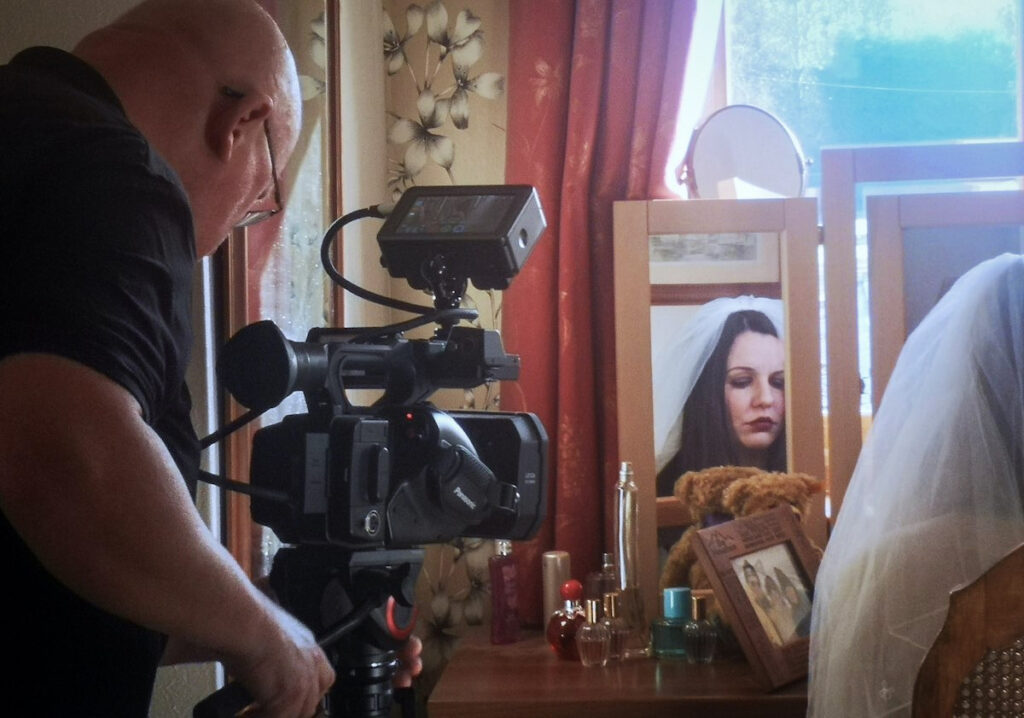Are you looking for support from a video production company in The Black Country or the wider West Midlands region?
Do you know how the video production process works and how to engage effectively with a video producer?
What steps are involved in successful video production?
What does the journey look like between commissioning a video production company and completing your video?
Read on to find out!

Location filming for corporate video production.
1: Consult a professional video production company. Actually, consult a few!
An enquiry costs you nothing and is definitely the first step towards producing engaging marketing and/or corporate video content. You may want to speak to two or three video production companies to get some idea of costs, production methods, and so on. Different companies work at very different scales, so you’ll need to match your needs with someone operating in your strata of the market. You’ll also find that different creators have very different production values. This means that you need to be sure that you’re on the same page when it comes to identifying your audience and needs.
You may have some ideas for your proposed production or not. If you do, discuss these during your meetings/calls/emails with your video production company. If you don’t, ask them if they have ideas that they can bring to the table, which they almost certainly will have. Make notes and then discuss these separately with others in your organisation to see what they think. Ultimately, you have to live with the finished product, so it’s important that it’s a good fit for your needs.
Once you’ve found a video production partner you’re happy with, it’s time to move to the next phase.
2: Planning and development (pre-production) is everything!
Why is this phase so important in video production?
Let’s cut to the chase: video production takes time and costs money! With this in mind, making sure that you get the most effective product, via the most efficient route is essential. Time and care taken during pre-production will always pay dividends. In short, planning for success is a no-brainer!
If you’ve engaged a good video production company they will support you with all aspects of pre-production including:
- Audience targeting
- Project specification (CTAs, style, onscreen text, captioning, etc)
- Idea development
- Narrative development (factual video relies on narrative just as much as fiction)
- Appropriate storyboarding and scripting
- Choosing or sourcing onscreen and voiceover talent
- Logistical planning and preparation (who, what, when, where, how)
Read more about the importance of pre-production
Find out why narrative is so important: Marketing videos and the power of narrative

A marketing video in production.
3: Filming your video (production).
Getting the best from your video production requires skill and know-how, not just a pile of fancy gear. Owning a barrow full of bricks doesn’t mean you know how to build a house.
If your video production company has liaised with you, practical issues such as filming schedule, shot lists, and locations should now be a given. With all this in place, you should find filming the video is a relatively straightforward task. However, that doesn’t mean that it’s a fast process! Just as the project as a whole requires thought and time during pre-production, each shot requires careful setup.
Location, lighting, exposure, colour balance, audio, and continuity all need to be managed carefully in order to get the best results from each shot. If you try to cut corners or rush the process, this will inevitably cause problems down the line, so patience and realistic expectations are a must. If the schedule that your video production company has proposed is realistic, everything should fit comfortably into the time allocated. They should also have allowed for contingencies.
Depending on who you have chosen to be in front of the camera, lack of experience and good old-fashioned nerves may come into play. Your video producer should account for this and also be prepared for some coaching and rehearsal during filming. You may want to use a teleprompter (autocue) to help with this. A teleprompter can save time and stress in the long run, even though setup and rehearsal may seem to waste time.
Learn more about filming video
4: Editing and polishing your video (post-production).
It’s easy to think that once the filming is complete the job is as good as done. However, you will find that generally speaking, post-production takes just as long as filming if not longer.
Post-production tasks include many things that you may not even have considered including:
- Reviewing and selecting from multiple takes
- Colour matching
- Audio normalisation and enhancement
- Adding graphics
- Adding lower thirds text
- Generating captions where these are required
- Applying and rendering visual effects
It’s also important that you, as the client, get to see and comment upon work in progress. This is why a rough cut/offline edit should be shared with you by your video production company at a relatively early stage.
It’s important that you are clear about the number of review/re-edit opportunities you have available in your agreement with your video production company. It’s possible that you’ll be happy the first time around, but unlikely. Provided that your video producer has satisfied the production brief, you can’t expect them to provide an unlimited number of revisions without charging for their time. With this in mind, you should review the video with other stakeholders, as they may think of something that you don’t!
Take your time on the review and rest yourself from watching the video. Returning to it rather than viewing it repeatedly in one sitting helps you to see the product with fresh eyes. As you do this, make a list of all the changes you require. Asking your video producers for multiple revisions in one go makes the most of an editing round.
At this stage, it’s important for you to assess your video production against your original aims. With this in mind, you might want to organise a preview with a group of colleagues or clients.
Find out more about video editing

My portable studio set up ready to film talking head videos.
5: Sharing your masterpiece with the world (Distribution).
Once everyone is happy with the final video production it’s time to put it in the public domain. Depending upon the stage you’re at in terms of marketing and promotion, you may have a very clear idea of where and how this will happen. If you don’t, discuss this with your video production company as they will be able to advise you which platforms and methods are most appropriate.
Once your video is posted, make sure that you let people know about it via your blog and social media channels. Send out a link over your mailing lists and make sure the video features on your company’s website. Having invested in the project, you should be prepared to spend a little of your advertising budget in promoting it over online channels.
6: Sit back and enjoy the fruits of your labours…..but also monitor its effect!
Having completed your video production, just like any other form of marketing or communication, you should assess its effect regularly. The penetration of your video may alter over time, in which case you may decide to invest more/less time and money promoting it. Monitoring shares on social media, click-throughs on your website, views on YouTube, etc will help you do this.
Learn more about my video production services.
Stourbridge-based Mooma Media offers event audio-visual support, event filming, live-streaming, video production, and still photography services to businesses, the public sector, and other non-commercial organisations throughout the Black Country and the wider West Midlands region. To discuss your project, or for a competitive quote click the button below.
Video production company serving business, public sector, and not-for-profit enterprise in and around:
West Midlands county: Birmingham, Solihull, Sutton Coldfield, West Bromwich, Dudley, Walsall, Wolverhampton.
Staffordshire: Lichfield, Tamworth, Stafford, Cannock,Burton upon Trent.
Shropshire: Telford, Shrewsbury, Bridgnorth, Kidderminster, Ludlow.
Worcestershire: Bromsgrove, Reditch, Droitwich, Worcester,
Warwickshire: Warwick, Stratford upon Avon, Leamington Spa, Coventry, Nuneaton,


Comments are closed